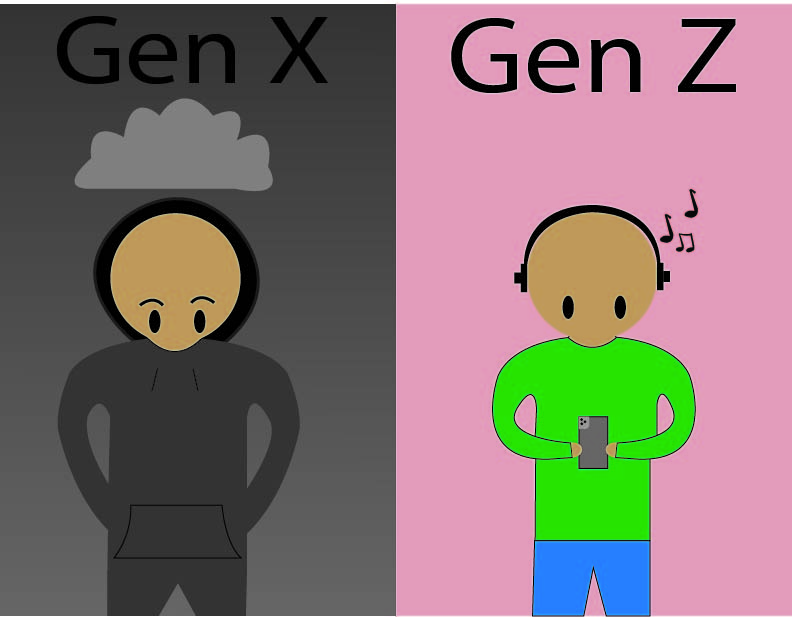The Reality of Generational Differences
October 12, 2021
Often, we hear references to names like “Gen Z” and “Baby Boomers” to “Gen X” and “Millennials.” You may recall hearing things labeling millennials as lazy or Baby Boomers as conservative. These different generations carry with them unique histories and influences, along with stereotypes and generalizations. It is important to understand the influences that have shaped each generation and the reasons why they are how they are today.
Gen Z includes the most recent generation born from 1997-2012, following Millennials, Gen X, and Baby Boomers. Frequently, younger generations are perceived to be more narcissistic or self-involved. Generations like Gen Z and Millennials grew up in a time of growing technology and worldwide advancements. This may explain why easier opportunities became available for these groups, often giving them stereotypes about their work ethic and attitudes. This is a simple example of how different influences shape how generalizations are presented and why they have such distinct traits. Research by West Midland Family Center states that Millennials “grew up more sheltered than any other generation as parents strived to protect them from the evils of the world.” A direct generalization that comes from this is a belief shared by junior Shelby Runje is that millennials are “soft or sensitive” especially when it comes to things like jokes. Meanwhile, Generation X was shaped by things like “growing up, having to take care of themselves early, and watching their politicians lie and their parents get laid off.” This may explain their tendency to be “worried about achieving work-life balance” or “not being able to enjoy retirement, getting stuck with no opportunities, or losing job securities” because of what they have previously been exposed to. The Baby Boomer generation has unintentionally shaped this generation and their beliefs, concerns, and motivations. Generation X member Rebecca Ragland supports this theory by saying her generation “had to take care of themselves at a young age, which makes us pretty resilient.”
A significant question often proposed is if generational differences and stereotypes are even real. Is each generation really that different or do simple experiences tend to make them act a certain way that may be difficult to comprehend from a different generation’s viewpoint? George Washington University psychologist David Costanza says that “the idea that Millennials or Gen X’ers are a distinct group—there’s literally no research that backs that up…Some research purports to, but it can be criticized in many ways. Those distinct groups just are not there.” Obviously, there are clear differences between different age groups, but these groups also contain many various types of people, all living under different conditions and influenced by unique experiences. Generalizations group many of these unique people into one homogenous expectation, ignoring the variants and the clear explanations for why these people may have certain “traits.” Gen X member Joe Ragland shares that he believes generalizations are made “because people like to categorize and put things in neat packages that makes it feel better for them even though it’s completely untrue.” Are our true intentions when forming stereotypes to organize others or to make ourselves seem better?
Although generalizations and stereotypes can be over exaggerated and may be incorrect in general, it is still important to recognize the differences between generations. Especially in a workplace, in order to interact effectively, we must all be aware of the things we have been through and that we were raised from. Harvard Business Review states that “firms and leaders need to understand the different preferences among these generational cohorts in order to make better decisions about leadership development, technology, training, and culture-building.” Knowing how each generation relates to each other is crucial. Some generations may work together better than others. For example, senior Sasank Gopisetti believes that Millenials and Gen Z work together the best because they are close in age and experienced similar things like the growth of technology from a young age. If we take the time to comprehend how we are different in things like attitudes, activities, values, and morals, and the history and influences behind these, we can form better relationships and even learn things from each other.
As more generations evolve, new societal patterns will form depending on the influences of the time period. A study from Harvard Business Review found that “when we asked which technologies are likely to revolutionize work in the coming decade, we learned that Gen Z was most enthusiastic about the potential of virtual reality.” New generations may be influenced by these same interests of technology and advancements, similar to Gen Z. It is important that as these generations form, we remember the conditions they were brought upon, and recognize that there are many individuals who may not fall under a simple stereotype. The more we encourage this mindset, the easier we can work together, share knowledge, and respect where we all came from.



